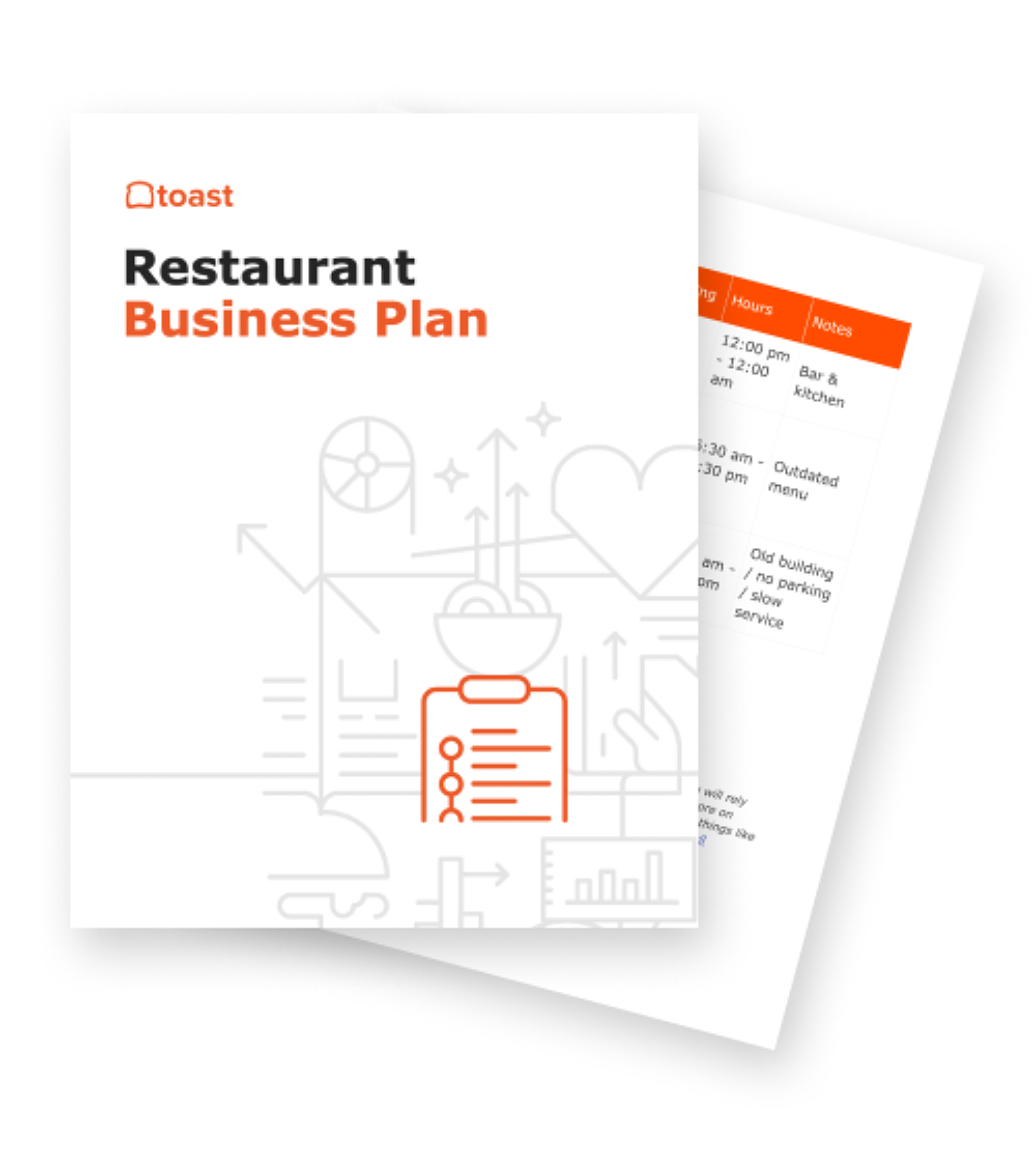
7 Licences and Permits Needed to Open a Restaurant
The licences and permits needed to open a restaurant and how to go about getting each of them.

Sam KusinitzAuthor


Restaurant Business Plan Template
No matter where you’re at in your restaurant ownership journey, a business plan will be your north star. Organise your vision and ensure that nothing is overlooked with this free template.
Get free downloadOpening a restaurant is neither a short nor a simple process.
Once you've nailed down a restaurant idea, found your ideal restaurant location, and pitched your restaurant business plan to investors, the most painstaking part of the process begins: licensing.
Acquiring all of the necessary food licences and permits involves a lot of paperwork and patience. It takes time for each and every one to be approved.
It's not fun, but it is absolutely necessary. This guide covers the licences needed to open a restaurant.
Licences and Permits Required to Open a Restaurant
- Restaurant Registration
- Employer Registration Number (ERN)
- Music Licence
- Value-Added Tax (VAT)
- Planning Permission
- Alcohol Licence
- Skip Permit
What Do You Need to Open a Restaurant?
1. Restaurant Licence
Step one: Restaurant Registration (also referred to as a food service licence). If you are planning to serve food to the public, you will need to register your restaurant with the Health Service Executive (HSE) Environmental Health Office.
This registration is necessary to ensure that your restaurant meets health and safety standards and follows proper food hygiene practices.
How to Get a Restaurant Licence
You will need to get in touch with the Health Service Executive (HSE) Environmental Health Office or the local authority responsible for food safety in your area. Request the application form for restaurant registration from the Environmental Health Office. You may be able to download the form online or obtain it in person from the office.
Once you have submitted your application, the Environmental Health Officer will conduct an inspection of your restaurant premises in order to assess whether your restaurant complies with food safety and hygiene standards. If approved, you will receive a restaurant registration certificate..
How Much Does a Restaurant Licence Cost?
Depending on the area and local regulations, there may be a registration fee which would need to be submitted along with your application.
2. Employer Registration Number (ERN)
Like a Food Business Registration, all businesses must also obtain an Employer Registration Number (ERN). This is a unique identifier assigned to an employer for tax purposes by the Revenue Commissioners.
How to Get an Employer Registration Number
You can apply for an Employer Tax Registration Number online through the Revenue Online Service (ROS) or by completing a paper form and submitting it to the Revenue Commissioners.
How Much Does an ERN Cost?
Obtaining an Employer Tax Registration Number is free!
Restaurant Opening Calculator
This calculator lays out some of the fundamental financial costs of opening a restaurant, so you can start planning and bring your dream restaurant to life.

3. Music Licence
Music is essential to a restaurant experience: adding to the ambiance, mood, and individual aesthetic. To play music in your restaurant, you'll need a music licence to avoid copyright infringement. This includes live music, as well as music from a CD, or streaming service.
IMRO.ie state that the penalty for playing copyrighted music without a licence can breach a maximum of €127,000 or time in prison.
Plus, nobody wants to get sued by Beyoncé. To protect your business from these fines, make sure you’ve secured a music licence before you hire that DJ or host a karaoke night.
How to Get a Music Licence
In most instances, restaurants in Ireland will need a PPI licence and need to pay the Irish Music Rights Organisation (IMRO) to be able to play music. Find out more about the PPI licence here and the IMRO requirements here.
How Much Does a Music Licence Cost?
The cost of a PPI licence can vary depending on the size of the premises and number of seats. You can apply for the licence online here. Also the IMRO licence can vary from €17 to €82 depending on the number of seats and type of royalty you use. More info can be found here.
4. VAT (Value-Added Tax)
If you are planning to purchase goods for your restaurant from suppliers within Ireland or other EU member states, you may need to provide your suppliers with a valid VAT identification number (VAT ID). The VAT ID is used for intra-EU transactions and enables your suppliers to charge VAT at the appropriate rate, depending on whether the goods are for business use or for resale.
As a restaurant owner in Ireland, you may also need to register for VAT if your taxable turnover exceeds the VAT registration threshold. If you are registered for VAT, you can recover VAT paid on your business purchases against VAT charged to your customers.
How to Register for VAT
To determine your specific VAT obligations and whether you need to register for VAT, you should check the current VAT registration threshold and VAT rules with the Revenue Commissioners. If you do need to register for VAT, you will receive a VAT identification number, which you can provide to your suppliers for intra-EU transactions.
How Much Does it Cost to Register for VAT?
There is no direct cost associated with registering for VAT in Ireland. Registering for VAT itself is free of charge. While registering for VAT is free, the ongoing VAT-related responsibilities and potential costs associated with VAT collection, reporting, and payment should be considered as part of your restaurant's financial planning.
5. Planning Permission
Depending on the location and nature of your restaurant, you may need planning permission from the local authority. This permission ensures that your restaurant's premises are suitable for the intended use and comply with zoning and building regulations.
In addition, if you are making significant changes to the building or carrying out structural alterations, you may need to obtain building regulations approval from the local authority or an approved inspector. This approval ensures that the construction work meets safety and building standards.
How to Get Planning Permission
It is recommended to work closely with the local planning authority as early as possible. Before applying for planning permission, do some research to understand the local planning policies and regulations that apply to your area. Check the local council's planning portal or website for information on planning guidelines and requirements, and consider engaging with a planning consultant or architect.
You will need to create a comprehensive proposal for your restaurant, including details about the location, size, layout, and intended use. Include plans, drawings, and any other supporting documents that help illustrate your proposed development. Before formally applying, consider submitting a "pre-application" or "pre-planning" inquiry to the local planning authority. This will allow you to get feedback on your proposal before making a full application. When ready, submit the relevant planning application form to your local planning authority. This is typically available for download from their website. You will receive a decision notice from the local planning authority, either granting planning permission, refusing permission, or granting permission with conditions. Be aware that the decision-making process can take several weeks or months, so be sure to factor this in to your timelines.
How Much Does Planning Permission Cost?
There may be an application fee, the amount of which varies depending on the scope and complexity of your proposal. To get a more accurate estimate of the potential costs involved in obtaining planning permission for your specific restaurant development, it is advisable to consult with a planning consultant, architect, or other relevant professionals who can provide a detailed cost breakdown based on your project's characteristics and location.
6. Alcohol Licence
If you plan to serve alcoholic beverages, you will need to apply for an alcohol licence known as a Restaurant Licence. There is also a Special Restaurant Licence which allows for the sale of alcohol without a requirement to serve meals. Start this process as early as possible. Depending on the location, it can take months to complete the application process and receive a licence from local licensing authority.
How to Get an Alcohol Licence
You can apply for a Special Restaurant Licence by completing and submitting an application form to the National Excise Licence Office.
How Much Does an Alcohol Licence cost?
Revenue.ie states the cost of this licence is €3,805 for a new licence and €500 on renewal.
Restaurant Business Plan Template
No matter where you’re at in your restaurant ownership journey, a business plan will be your north star. Organise your vision and ensure that nothing is overlooked with this free template.

7. Skip Permit
Not often considered, but often needed, the skip permit allows your restaurant to situate a skip outside your kitchen, where chefs can dispose of food waste.
The stipulations and cost of the skip permit depend on the size of the dumpster, the exact placement of it, and the restaurant location.
How to Get a Skip Permit
This process varies widely city to city, so google "your city" and "skip permit" to find out the requirements of your local council. The required forms should typically be found online. For example, here is the Dublin City Council application information.
How Much Does a Skip Permit Cost?
To find out the exact cost of a skip placement permit for your restaurant, you should contact your local council. They can provide you with detailed information on the specific fees and requirements for obtaining a skip permit.
Licences and Permits Across Ireland
As you've certainly learned throughout this article, licences and permits for restaurants vary depending on location.
Business owners need to research their own local regulations, as these all vary depending on your restaurant’s location. Generally, visiting your local council or authority's website can help you find out which permits and licences you need.
Also, be sure to keep your licence current. “Some licences and permits expire after a set period of time. Keep close track of when you need to renew them — it's often easier to renew than it is to apply for a new one.
Your Next Steps
If you've been adding in your head while reading this post, you know that all in all, the process of licencing can cost well over €250 before you open doors, and should be factored into your restaurant numbers and metrics. And make sure to plan ahead, because it can take 2-3 months or even longer to get everything approved.
It’s an investment, but an exciting one — that will get you started on your way to opening up that new concept. Make sure to start with a restaurant business plan to get every step planned out.
Download your free restaurant business plan template, and if you're ready, start applying for these food licences and restaurant permits now.
These are only some of the primary licences and permits restaurants must acquire to open and operate legally. The exact laws and regulations for each licence are often specific to different cities and counties.
Make sure that you understand all of the various licences you will need. It can be a tedious and drawn-out process, but securing all of the necessary permits is a critical step towards opening your new restaurant and avoiding unnecessary penalties.
Related Resources
Restaurant Floor Plan Templates
Use these restaurant floor plan templates to get inspired as you map, or reimagine, the layout and space setup for your restaurant.

Is this article helpful?
DISCLAIMER: This information is provided for general informational purposes only, and publication does not constitute an endorsement. Toast does not warrant the accuracy or completeness of any information, text, graphics, links, or other items contained within this content. Toast does not guarantee you will achieve any specific results if you follow any advice herein. It may be advisable for you to consult with a professional such as a lawyer, accountant, or business advisor for advice specific to your situation.
Subscribe to On the Line
Sign up to get industry intel, advice, tools, and honest takes from real people tackling their restaurants’ greatest challenges.
